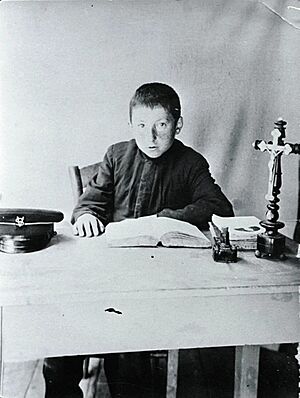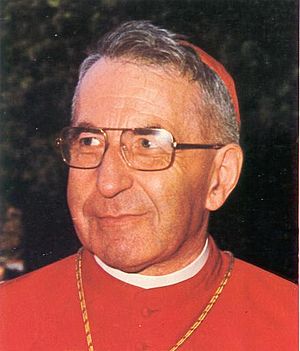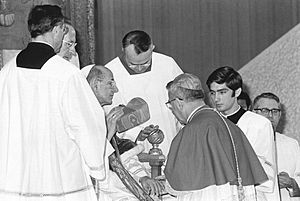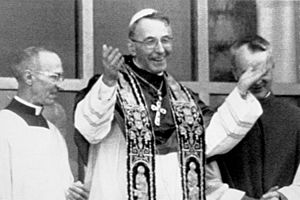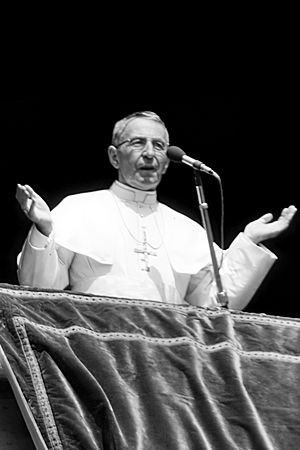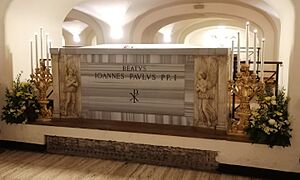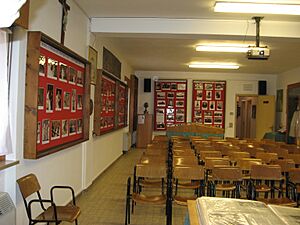Pope John Paul I facts for kids
Quick facts for kids Pope Blessed John Paul I |
|
|---|---|
| Bishop of Rome | |
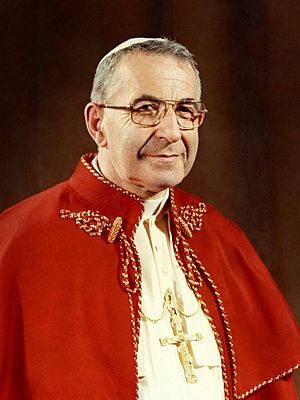
Official photograph, 1978
|
|
| Church | Catholic Church |
| Papacy began | 26 August 1978 |
| Papacy ended | 28 September 1978 |
| Predecessor | Paul VI |
| Successor | John Paul II |
| Orders | |
| Ordination | 7 July 1935 |
| Consecration | 27 December 1958 by John XXIII |
| Created Cardinal | 5 March 1973 |
| Personal details | |
| Birth name | Albino Luciani |
| Born | 17 October 1912 Canale d'Agordo, Belluno, Veneto, Kingdom of Italy |
| Died | 28 September 1978 (aged 65) Apostolic Palace, Vatican City |
| Previous post |
|
| Education | Pontifical Gregorian University (PhD) |
| Motto | Humilitas (Humility) |
| Signature | |
| Coat of arms |  |
| Sainthood | |
| Feast day | 26 August |
| Venerated in | Roman Catholic Church |
| Beatified | 4 September 2022 Saint Peter's Square, Vatican City by Pope Francis |
| Attributes |
|
| Patronage | Catechists |
| Other Popes named John Paul | |
Pope John Paul I (born Albino Luciani; 17 October 1912 – 28 September 1978) was the leader of the Catholic Church and Vatican City for 33 days in 1978. His time as pope was one of the shortest in history. This led to 1978 being known as the "year of three popes." He was the last Italian-born pope.
Before he was chosen as pope, he didn't want the job. He even told friends he would say no if elected. But when the cardinals chose him, he felt he had to accept. He was the first pope to choose a double name, "John Paul." He picked this name to honor the two popes before him, John XXIII and Paul VI. He was also the first pope to use the number "I" (the First) after his name.
His successors, John Paul II and Benedict XVI, often spoke about his kind nature. In Italy, he is known as "The Smiling Pope" (Il Papa del Sorriso). Time magazine called him "The September Pope." There's a museum in his hometown dedicated to his life.
He was declared a servant of God in 2003, the first step towards becoming a saint. In 2017, Pope Francis named him Venerable. Pope Francis then beatified him on 4 September 2022.
Contents
Early Life and Education
Albino Luciani was born on 17 October 1912 in a small village called Forno di Canale (now Canale d'Agordo) in northern Italy. His father, Giovanni, was a bricklayer. His mother was Bortola Tancon. Albino was the oldest of four children. He was baptized on the day he was born because he was very weak.
When he was 10, a friar visited his village. Albino was so inspired that he decided he wanted to become a priest. His father supported him, saying he hoped Albino would "be on the side of the workers."
Luciani began studying at a seminary in 1923. A seminary is a school for training priests. He later tried to join the Jesuits, a Catholic religious order, but his seminary rector said no.
Becoming a Priest and Teacher
Albino Luciani became a priest on 7 July 1935. He first worked as a curate in his hometown. In 1937, he became a professor and vice-rector at the Belluno seminary. He taught subjects like theology and Church law.
In 1941, Luciani began working on his doctorate degree in theology. He wrote his thesis on the origin of the human soul. He earned his doctorate in 1947 with high honors.
In 1947, he was made chancellor to the Bishop of Belluno. He also published his first book, Catechesis in crumbs. This book was about teaching faith in a simple, easy-to-understand way.
Serving as a Bishop
On 15 December 1958, Pope John XXIII appointed Luciani as the Bishop of Vittorio Veneto. He became a bishop later that month. His motto as bishop was Humilitas, meaning "Humility." He told his new diocese that he wanted to be "a teacher and a servant."
He took part in all sessions of the Second Vatican Council (1962–1965). This was an important meeting of Catholic bishops that updated many Church practices. In 1962, he wrote a letter to explain the Council's purpose to his people.
In 1966, Luciani visited Burundi in East Africa.
On 15 December 1969, Pope Paul VI appointed Luciani as the new patriarch of Venice. This is a very important role in the Church. He took charge of his new archdiocese in February 1970.
Synod of Bishops in 1971
In 1971, Luciani attended a meeting of bishops in Rome. He suggested that richer dioceses should give 1% of their income to poorer countries. He said this money should be given "not as alms, but something that is owed." He felt it would help make up for injustices caused by richer nations.
Becoming a Cardinal
Pope Paul VI made Luciani a Cardinal-Priest on 5 March 1973. This is one of the highest ranks in the Catholic Church.
As Patriarch of Venice, Luciani had disagreements with priests who supported making divorce easier in Italy. He believed in the Church's teaching on marriage.
In 1975, Luciani traveled to Germany and Brazil. While in Brazil, he met with other clergy members. Later that year, he visited Fatima, Portugal. There, he met Sister Lucia dos Santos, one of the children who saw visions of the Blessed Virgin Mary in 1917. Sister Lucia called him "Holy Father," which surprised the humble cardinal.
In January 1976, he published a book called Illustrissimi. It was a collection of letters he wrote to famous historical and fictional people. These included Dickens, Pinocchio, and King David.
In 1976, Luciani sold a valuable gold cross and chain that belonged to him. He did this to raise money for children with disabilities. He also encouraged other priests in Venice to sell their valuables to help this cause. He wanted them to live simply. He also set up family counseling clinics to help poor families.
Papacy
Election as Pope
Pope Paul VI died on 6 August 1978. Luciani was called to Rome for the meeting (called a conclave) to elect the new pope. Luciani was not expected to be chosen. However, some cardinals felt he would be a good leader.
Luciani was elected on the fourth vote of the conclave. He had told his secretary that he would refuse the papacy if elected. But when asked if he accepted, he said, "May God forgive you for what you have done," and then accepted. He chose the name John Paul I to honor his two predecessors, John XXIII and Paul VI. He was the first pope to choose a double name and the first to use "the First" in his papal name.
Many cardinals were very happy with his election. Mother Teresa said he was "the greatest gift of God, a sunbeam of God's love."
Changes as Pope
John Paul I quickly made some changes to make the pope's role seem more human. He was the first modern pope to use "I" instead of the formal "we" when speaking. He also refused to wear the traditional papal tiara (a crown). Instead of a coronation, he had a simpler "papal inauguration" ceremony. He was the last pope to use the sedia gestatoria, a special chair carried by attendants, which he only used because others convinced him it helped people see him.
His motto was Humilitas, meaning 'Humility'. In his first public address, he impressed the world with his friendly manner.
Church Policies
John Paul I had a six-point plan for his papacy:
- To renew the Church based on the Second Vatican Council.
- To update Church law.
- To remind the Church to spread the Gospel.
- To encourage Church unity.
- To promote dialogue with others.
- To work for world peace and justice.
He believed in showing God's mercy. He said that God has "so much tenderness for us." He also stressed the importance of doing good deeds and showing kindness to others.
Interfaith Dialogue
John Paul I was friendly towards Muslim people. As Patriarch of Venice, he said that Muslims had the "right to build a mosque" in the archdiocese. He believed in religious freedom for all.
Universal Call to Holiness
Luciani often spoke about the "universal call to holiness." He believed that all Catholics are called by God to be saints. He said that sainthood is not just for a few special people, but something everyone can achieve by serving God.
Personality
John Paul I was known as a great communicator and writer. His book Illustrissimi showed his clever and warm personality. He was also well-read and enjoyed reading several newspapers each morning.
People were impressed by his personal warmth and kindness. He was seen as a gentle and friendly person, which quickly made him popular around the world. He was a very skilled speaker.
His aides said he was not as naive as some critics thought. He quickly understood his new role as pope and handled it with confidence. He often joked with the sisters who worked in the Vatican.
Death
On 29 September 1978, just 33 days into his papacy, John Paul I was found dead in his bed. He likely died from a heart attack during the night. Many countries declared days of mourning after the news.
His funeral was held in Saint Peter's Square on 4 October 1978. He was buried in the Vatican grottoes. There have been some conspiracy theories about his death, but these are not supported by evidence.
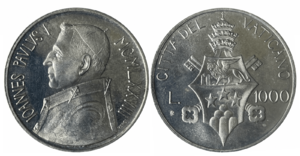
Path to Sainthood
| Blessed John Paul I |
|
|---|---|
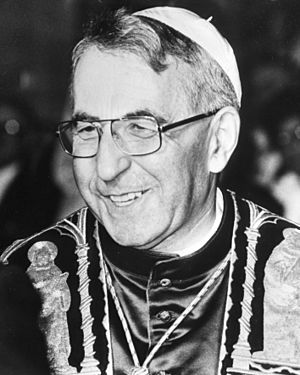
John Paul I on 19 September 1978
|
|
| Pope; Confessor | |
| Born | Albino Luciani 17 October 1912 Forno di Canale, Belluno, Kingdom of Italy |
| Died | 28 September 1978 (aged 65) Apostolic Palace, Vatican City |
| Venerated in | Roman Catholic Church |
| Beatified | 4 September 2022, Saint Peter's Square, Vatican City by Pope Francis |
| Feast | 26 August |
| Attributes | Papal attire Pallium |
| Patronage | Canale d'Agordo Diocese of Vittorio Veneto Patriarchate of Venice Catechists |
The process to make John Paul I a saint began in 1990. Many bishops asked Pope John Paul II to start the process.
In 2003, the Church officially declared him a Servant of God. This is the first step in the sainthood process. The Church then collected documents and testimonies about his life.
In 2017, Pope Francis declared John Paul I to be Venerable. This means the Church recognized that he lived a life of "heroic virtue."
Beatification
For John Paul I to be beatified, the Church needed to confirm a miracle happened through his prayers.
In 2019, medical experts confirmed that the healing of a nun in Argentina was a miracle. She had a serious brain illness, and her recovery had no scientific explanation. Theologians also agreed that the healing was due to John Paul I's intercession.
Pope Francis officially recognized this miracle on 13 October 2021. This allowed John Paul I to be beatified. He was declared "Blessed" on 4 September 2022, in Saint Peter's Square.
Legacy
Pope John Paul I was the first pope to skip the traditional papal coronation. He was also the first to choose a double name, "John Paul." His successor, Karol Józef Wojtyła, chose the same name to honor him. John Paul I was the first pope to have a simpler Papal Inauguration. He was also the last pope to use the Sedia Gestatoria.
Views of Successors
Pope John Paul II was elected after John Paul I's death. He spoke about his predecessor in his first message as pope.
Pope Benedict XVI also spoke about John Paul I in 2008, on the 30th anniversary of his death.
Pope Francis mentioned John Paul I often in his 2016 book, The Name of God Is Mercy. Francis said he was very touched by John Paul I's writings.
Media
- In 2006, Italian TV made a miniseries about his life called Papa Luciani: Il sorriso di Dio.
- A conspiracy theory about his death is shown in the 1990 movie, The Godfather Part III.
See also
 In Spanish: Juan Pablo I para niños
In Spanish: Juan Pablo I para niños
 | Selma Burke |
 | Pauline Powell Burns |
 | Frederick J. Brown |
 | Robert Blackburn |


